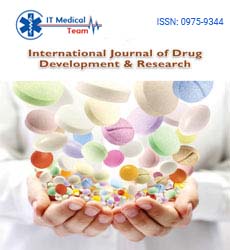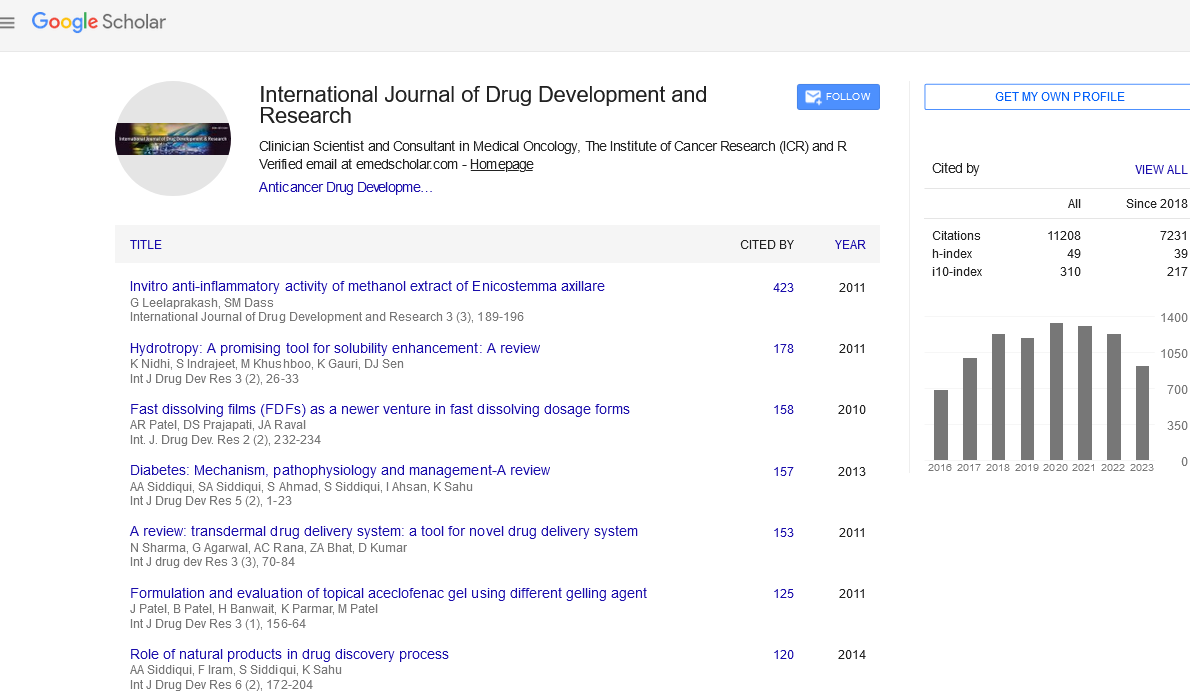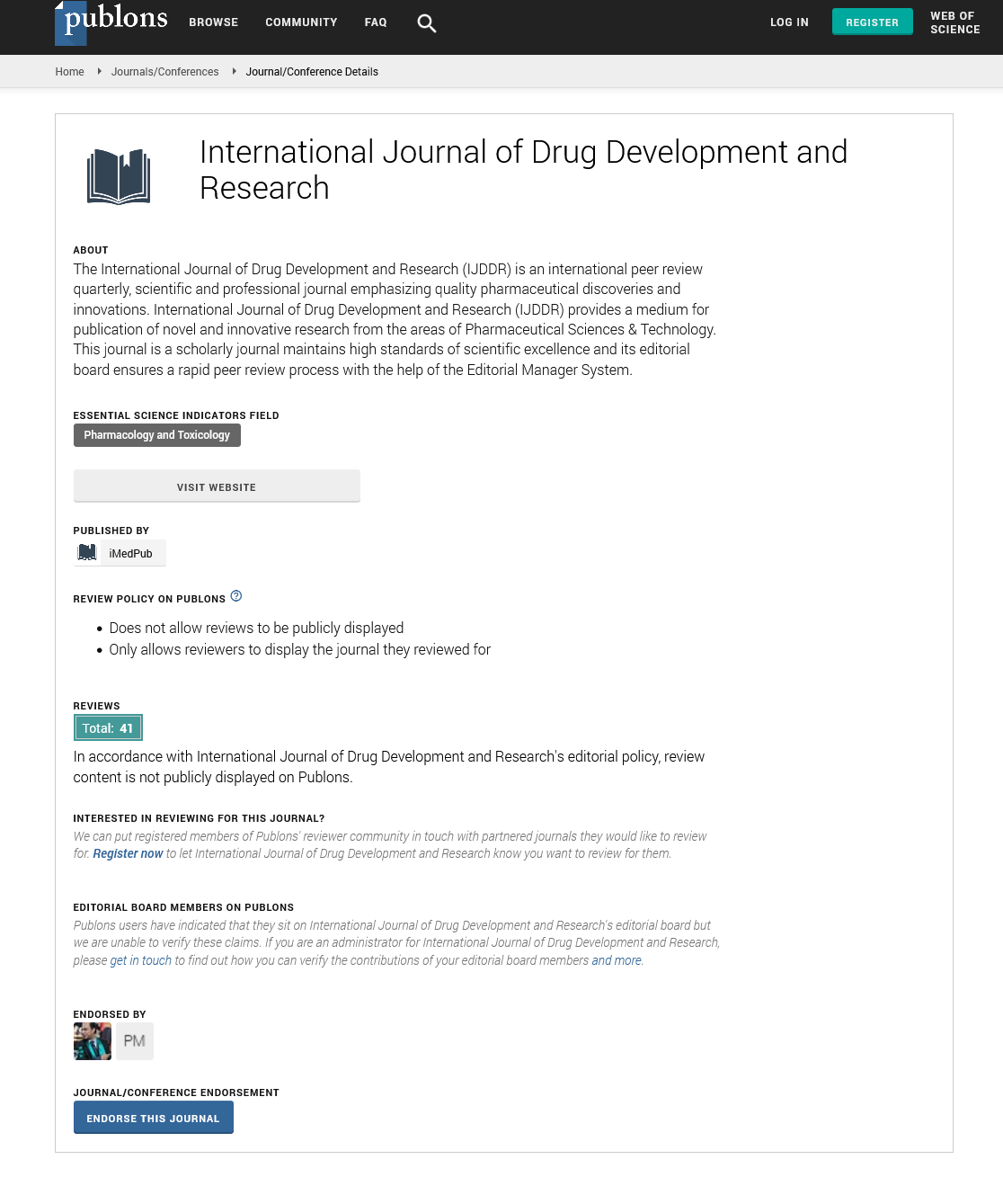Perspective - (2023) Volume 15, Issue 5
Advancements in drug development research: A journey towards better healthcare
Sven Stegemann*
Department of Pharmaceutical Sciences, University of Freiburg, Breisgau, Germany
*Correspondence:
Sven Stegemann, Department of Pharmaceutical Sciences, University of Freiburg, Breisgau,
Germany,
Email:
Received: 08-Sep-2023, Manuscript No. ijddr-23-14168;
Editor assigned: 11-Sep-2023, Pre QC No. P-14168;
Reviewed: 25-Sep-2023, QC No. Q-14168;
Revised: 02-Oct-2023, Manuscript No. R-14168;
Published:
10-Oct-2023
Introduction
Drug development research is a dynamic and continually
evolving field that plays a pivotal role in improving
healthcare outcomes across the globe. The process of
bringing a new drug from the initial concept to market
availability is complex and resource-intensive, but it
is essential for addressing unmet medical needs and
advancing the quality of patient care. This article delves
into the fascinating world of drug development research,
exploring its stages, challenges, and recent advancements.
The field of drug development research has witnessed
remarkable advancements in recent years, shaping the
future of medicine and patient care. From novel drug
discovery techniques to ground breaking approaches in
clinical trials and precision medicine, these breakthroughs
are revolutionizing the pharmaceutical industry.
In this article, we will explore some of the most promising
advancements in drug development research, highlighting
their potential to improve healthcare outcomes and patient
lives.
Description
The drug development process
• Discovery and target identification: Drug
development begins with the identification of a
biological target, such as a specific protein or gene
associated with a disease. Researchers search for
molecules that can interact with this target and
modify its activity, potentially offering a therapeutic
benefit.
• Preclinical research: In this stage, potential drug
candidates are tested in laboratory settings and
animal models. Researchers investigate the safety and
efficacy of these compounds, seeking to understand
their potential risks and benefits.
• Clinical trials: Once a promising candidate is
identified, it advances to clinical trials, which consist
of three phases. Phase I focuses on safety and dosage,
phase II assesses the drug's effectiveness, and phase
III involves large-scale testing to confirm its safety
and efficacy in a diverse population.
• Regulatory approval: After successfully completing
clinical trials, drug developers submit extensive data to regulatory agencies such as the FDA in the United
States or the EMA in Europe. These agencies evaluate
the drug's safety and effectiveness before granting
approval for market distribution.
• Post-market surveillance: Even after a drug is
approved and available to the public, ongoing
monitoring is crucial to detect rare side effects or
long-term safety concerns. This stage ensures that
the drug's benefits continue to outweigh any risks.
Challenges in drug development
• High costs: Developing a new drug is a costly
endeavor, with estimates ranging from hundreds of
millions to over a billion dollars. This cost includes
research, preclinical and clinical trials, and regulatory
processes.
• Time-consuming: On average, it takes around 10-15
years to bring a new drug from discovery to market, a
timeline that poses challenges for patients in need of
innovative treatments.
• High failure rates: Many drug candidates fail to
progress past the preclinical or clinical trial stages.
This high attrition rate is often due to issues like
safety concerns, lack of efficacy, or unexpected side
effects.
• Regulatory hurdles: Regulatory agencies require
rigorous testing and extensive documentation, adding
to both the time and cost of drug development.
Recent advancements in drug
development research
• Precision medicine: One of the most exciting
developments in drug development is the advent of
precision medicine. This approach tailors treatments
to individual patients based on their genetic makeup
and specific disease characteristics. By identifying the
right drug for the right patient, precision medicine
enhances efficacy and minimizes side effects.
• Artificial Intelligence (AI) and machine learning: AI and machine learning are being utilized to process
vast amounts of data, accelerating drug discovery.
These technologies can predict potential drug
candidates, optimize clinical trial design, and help
repurpose existing drugs for new uses.
• Biotechnology and gene therapies: Advances in
biotechnology have opened new avenues for drug
development, particularly in the field of gene
therapies. Techniques like CRISPR-Cas9 enable scientists to
edit genes, potentially curing genetic diseases at their
source.
• Immunotherapy: Immunotherapy has revolutionized
cancer treatment. It harnesses the power of the
immune system to target and destroy cancer cells,
offering more targeted and less toxic alternatives to
traditional treatments.
• Rapid diagnostic tools: Quick and accurate
diagnostic tools allow for better patient stratification
in clinical trials. This ensures that the right patients
are selected, increasing the likelihood of
demonstrating a drug's efficacy.
• Collaborative initiatives: Collaborative efforts
between academia, pharmaceutical companies, and
government organizations have become more
common. These partnerships foster information-sharing,
reduce duplication of efforts, and expedite
the drug development process.
Conclusion
Drug development research is a vital component of modern
healthcare, responsible for bringing innovative treatments to
patients in need. While it comes with significant challenges
such as high costs, lengthy timelines, and regulatory
hurdles, recent advancements in precision medicine,
artificial intelligence, gene therapies, immunotherapy,
diagnostic tools, and collaborative initiatives are reshaping
the landscape. As these innovations continue to evolve,
they offer promise for more effective and efficient drug
development, ultimately improving patient outcomes and
the overall state of global healthcare.
The advancements in drug development research are
transforming the landscape of healthcare. From AI-driven
drug discovery to personalized medicine and the use of
CRISPR technology for gene editing, these innovations are
promising to provide safer, more effective treatments for a
wide range of diseases. As these breakthroughs continue to
evolve and mature, patients can look forward to a future
where medical conditions once considered untreatable
become manageable, and lives are improved through
cutting-edge pharmaceuticals. These advancements
highlight the remarkable progress the pharmaceutical
industry has made and the bright future that awaits us in
the world of medicine and healthcare.






